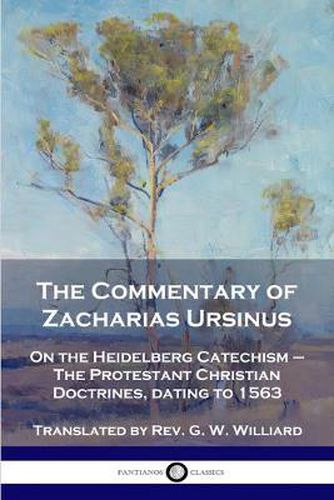Readings Newsletter
Become a Readings Member to make your shopping experience even easier.
Sign in or sign up for free!
You’re not far away from qualifying for FREE standard shipping within Australia
You’ve qualified for FREE standard shipping within Australia
The cart is loading…






This title is printed to order. This book may have been self-published. If so, we cannot guarantee the quality of the content. In the main most books will have gone through the editing process however some may not. We therefore suggest that you be aware of this before ordering this book. If in doubt check either the author or publisher’s details as we are unable to accept any returns unless they are faulty. Please contact us if you have any questions.
Zacharias Ursinus was a Reformed Christian theologian who authored the Heidelberg Catechism, an early Protestant document about faith, written in question-and-answer format.
Living amid the fractious religious upheaval that ensued following the Protestant Reformation, Ursinus was in the vanguard of theologians and Christian authors in Germany. The newly-established Reformed church wished to cement its influence among the populace; to this end, authors wrote and published a series of books that answered queries on faith. The Heidelberg Catechism was one of the most influential, gaining a wide readership and proving vital to the establishment of Protestantism, with its organized composition of 52 Lord’s Days - one for each week of the year - allowing for ease of teaching.
Ursinus’s explanations are cogent, setting out principles of Christianity by answering a variety of questions on subjects such as Jesus Christ, baptism, sin, forgiveness and salvation. Both the New Testament Gospels and Old Testament lore are examined; of particular note is the author’s explanations of Moses’ Ten Commandments and their unceasing importance in Christian life. Cultural questions are also considered; the role of the church in society, and the ceremonies that believers participate in. There are notable allusions to the ongoing hostilities of his time; Ursinus occasionally makes derogatory references to the Catholic church, referring to its believers as a ‘Popish mass’.
$9.00 standard shipping within Australia
FREE standard shipping within Australia for orders over $100.00
Express & International shipping calculated at checkout
This title is printed to order. This book may have been self-published. If so, we cannot guarantee the quality of the content. In the main most books will have gone through the editing process however some may not. We therefore suggest that you be aware of this before ordering this book. If in doubt check either the author or publisher’s details as we are unable to accept any returns unless they are faulty. Please contact us if you have any questions.
Zacharias Ursinus was a Reformed Christian theologian who authored the Heidelberg Catechism, an early Protestant document about faith, written in question-and-answer format.
Living amid the fractious religious upheaval that ensued following the Protestant Reformation, Ursinus was in the vanguard of theologians and Christian authors in Germany. The newly-established Reformed church wished to cement its influence among the populace; to this end, authors wrote and published a series of books that answered queries on faith. The Heidelberg Catechism was one of the most influential, gaining a wide readership and proving vital to the establishment of Protestantism, with its organized composition of 52 Lord’s Days - one for each week of the year - allowing for ease of teaching.
Ursinus’s explanations are cogent, setting out principles of Christianity by answering a variety of questions on subjects such as Jesus Christ, baptism, sin, forgiveness and salvation. Both the New Testament Gospels and Old Testament lore are examined; of particular note is the author’s explanations of Moses’ Ten Commandments and their unceasing importance in Christian life. Cultural questions are also considered; the role of the church in society, and the ceremonies that believers participate in. There are notable allusions to the ongoing hostilities of his time; Ursinus occasionally makes derogatory references to the Catholic church, referring to its believers as a ‘Popish mass’.